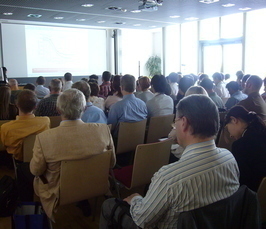MPI Colloquia Series: Univ.-Prof. Dipl.-Ing. Dr. Barbara Kaltenbacher: Iterative regularization of time-dependent inverse problems
MPI Colloquia Series: Univ.-Prof. Dipl.-Ing. Dr. Barbara Kaltenbacher: Iterative regularization of time-dependent inverse problems
- Date: Jan 10, 2019
- Time: 05:00 PM - 06:00 PM (Local Time Germany)
- Speaker: Univ.-Prof. Dipl.-Ing. Dr. Barbara Kaltenbacher
- Institute of Mathematics, University of Klagenfurt, Austria
- Location: Max-Planck-Institut Magdeburg
- Room: Big Seminar Room "Prigogine"
- Host: jointly organized by the Faculty of Mathematics at Otto von Guericke University and Max Planck Institute Magdeburg
- Contact: sek-csc@mpi-magdeburg.mpg.de

The Max Planck Institute Magdeburg invites you to its series of colloquia.
Top-class scientists, from notable German and worldwide research
institutions, give a survey of their research work. Everybody who is
interested, is invited to attend.
Iterative regularization of time-dependent inverse problems
Abstract:
A large number of inverse problems in applications ranging from
engineering via economics to systems biology can be formulated as a
nonlinear state space system, where some finite or infinite dimensional
parameter is supposed to be identified from additional continuous or
discrete indirect observations. This will be illustrated by some
parameter identification problems in time dependent partial differential
equations.
Due to the ill-posedness of such
inverse problems -- especially in case of infinite dimensional
parameters -- the problem needs to be regularized.
The focus
of this talk will be on the use of iterative (gradient or Newton type)
methods for this purpose, where regularization is achieved by early
stopping. We will highlight the difference between classical reduced
formulations based on a parameter-to-state-map, and an all-at-once
approach. Moreover, we will consider a splitting of these inverse
problems into smaller subsystems, by means of a subdivision of the time
line in subintervals, as well as cyclic iterations over these
subproblems -- so-called Kaczmarz methods.